"El alfil blanco se come a la dama negra [...] el escorpión se clava la cola... es la primera vez en mi vida que presencio [...] un suicidio sobre el tablero."— Arturo Pérez-Reverte, La tabla de Flandes
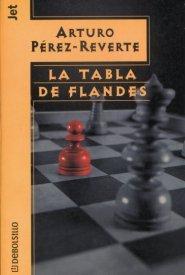 Summer reading. That's why I'm posting this. The hope of influencing your summer reading lists. Maybe I'll post some other book recommendations. I've got a few on my list which are about Spain or are by Spaniards. But mostly I'm recommending this book, and this author, because, after I finished reading it and then looked over my list of books I've read (a list I've kept since I was 12 years old), I realized
Summer reading. That's why I'm posting this. The hope of influencing your summer reading lists. Maybe I'll post some other book recommendations. I've got a few on my list which are about Spain or are by Spaniards. But mostly I'm recommending this book, and this author, because, after I finished reading it and then looked over my list of books I've read (a list I've kept since I was 12 years old), I realized It's not that I'm afraid of reading in Spanish. I read _a lot_ of online news in Spanish, especially El País. I've read plenty of history books in Spanish (a professional hazard). And this wasn't even the first novel I've read in Spanish for fun. (Late last year I finished the Murakami 1Q84 trilogy in Spanish translation, rather than English translation, because the Spanish copy came out a month earlier!) It's just that recently I've read so little fiction, so little for fun, and of that even less that is contemporary fiction. (I have a soft spot for 19th-century literature). That when I thought about books I would read in Spanish by Spanish authors, I always tended to fall back on the
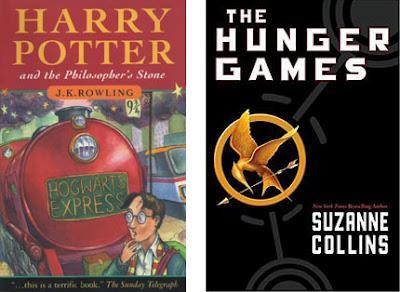
Page-hits experiment: I suspect Google Image Search favors images that provide
odd combinations of high profile visuals... So will this visual combo of best-
selling novels draw more web-search traffic to this blog entry? I'll let you know.
Sure, there are a couple of living authors on that Advanced Placement list, and one that is Spanish: Rosa Montero. (Mental note: add Montero to my longterm reading list.) But believe it or not, Spaniards are still publishing great literature, and it is not all about blood and sand, or even flamenco and gypsies. For example, two other names to keep an eye out for: Javier Marías, whose 1992 novel, Corazón tan blanco, was a big hit; and Carlos Ruiz Zafón, whose historical fiction, La sombra del viento (2001), seems to have gradually appeared on all my Spanish friends' bookshelves over the past decade since its release. Clearly that's not an exhaustive list, but a first impression of current best-seller Spanish authors.
 And another such living and breathing (and tweeting), and best-selling author is Pérez-Reverte. I knew about him because my well-meaning wife bought me his book, yes this book, many, many years ago as part of Project Get-husband-to-improve-his-Spanish-through-immersion-in-good-popular-contemporary-literature. In my
And another such living and breathing (and tweeting), and best-selling author is Pérez-Reverte. I knew about him because my well-meaning wife bought me his book, yes this book, many, many years ago as part of Project Get-husband-to-improve-his-Spanish-through-immersion-in-good-popular-contemporary-literature. In my 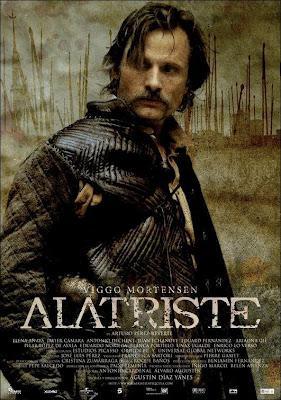
Viggo Mortensen grew up in South America, mostly Argentina,
and because of this is fluent in Spanish... That and his ability to
ride horses made him a clear front candidate for this Spanish production.
La tabla de Flandes (1990) was one of Pérez-Reverte's earliest hits. Following his usual signature of weaving history into his stories, it is a crime novel about an art restorer, Julia, who lives in present-day Madrid but is charged with restoring a mysterious 15th-century Flemish painting, "The Chess Game". Very early in the novel she discovers the painting carries a hidden message, "Quis necavit equitem", Latin for "Quién mató al caballero" ("who killed the knight"). In her efforts to unravel the painting's history and riddle, she and her friends and colleagues become embroiled in a criminal investigation with murder, mystery and suspense... Among the novel's more ingenious story-lines is that Julia and friends attempt to reconstruct the chess game in the painting, leading to some interest chess play and game-of-life plot twists. (I.e. the book is _great_ for chess fans... and also good for learning chess ("ajedrez") vocabulary in Spanish... rey, dama or reina, caballo, alfil, torre, peón... jaque, and jaque mate). Above all, I was impressed with the novel's vivid passages and pauses in the plot where Pérez-Reverte takes the time to describe the setting or surrounding and blend this with the mood of the location or protagonist. (Again, all great moments for non-native readers like me to encounter new vocabulary.) This novel was also made into a movie, Uncovered (1995), which, now that I know about, I'm going to have to hunt down and watch.
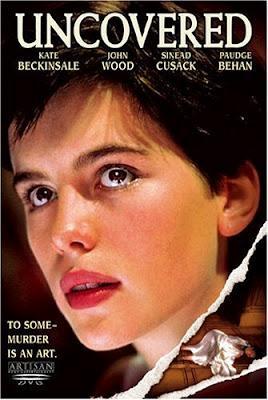
Kate Beckinsale in a movie called "uncovered"... hmmm.
If the search ranking of my past blog entries is any predictor,
something tells me including this poster picture of Kate Beckinsale
is going to dramatically increase the page hits of this entry.
(Notice how the "Dark eyes, dark hair, thick lisp..." entry is
always sitting in the "Popular Posts this Week" tab on the right.
I wonder why?)
 Reading tip on skimming ("leer por encima"): The trouble with reading good literature in a foreign language is that your mind's eye still hasn't learned how to ignore all those words on the page that you don't need to read in order to understand what's going on in the story. Nobody really reads every word of a book... except (hopefully) the author, (doubtfully) the editor, (probably) some literary critics or graduate students writing their dissertation on it, and (possibly) some future writers who are themselves hoping to learn the art of explication and how to win with words. The rest of us have learned how to ignore "extra" words in a sentence as you read or to pass over descriptive, "internal" sections. (I'm sorry Henry James, but I think I'll pass over that vivid and fascinating description of the estate's well-groomed shrubs; thank you Dostoyevsky, but I think I more than got the psychology of our protagonist 20 pages
Reading tip on skimming ("leer por encima"): The trouble with reading good literature in a foreign language is that your mind's eye still hasn't learned how to ignore all those words on the page that you don't need to read in order to understand what's going on in the story. Nobody really reads every word of a book... except (hopefully) the author, (doubtfully) the editor, (probably) some literary critics or graduate students writing their dissertation on it, and (possibly) some future writers who are themselves hoping to learn the art of explication and how to win with words. The rest of us have learned how to ignore "extra" words in a sentence as you read or to pass over descriptive, "internal" sections. (I'm sorry Henry James, but I think I'll pass over that vivid and fascinating description of the estate's well-groomed shrubs; thank you Dostoyevsky, but I think I more than got the psychology of our protagonist 20 pages What's difficult in foreign languages is that your eye has a harder time picking up those subtle cues which tell you what part of the text is "extraneous" and what is critical. (This can be particularly troublesome in "whodunits", where a missed pronoun might make the difference between catching subtle foreshadowing —the butler in the dining room with the axe versus the maid in the salon with the pistol— and wondering why they haven't come out and said who the killer is. (Parenthetical to the parenthetical comment: note how Pérez-Reverte avoids incriminating gendered-language, e.g. uses lots of gender ambiguous "su", towards the end of this novel when the protagonists guess who did it, but we the reader still don't know.)) So my advice is that you go easy on yourself and not worry about whether you've understood everything on a page. Chances are whatever you missed will be more than clearly spelled out on the next page, or soon enough. It is as important to learn to enjoy reading a book in a foreign language, as it is to master said language by learning through reading books.

Of course, this is not to say that slow reading doesn't have its merits.
The key is to find a balance between pausing every third line to look
up a new word or marvel at a well-written passage, and trying to move
forward through the book at a pace where the plot continues
to engage your interest.
The joy in reading (contemporary) fiction in a foreign language is that you get introduced to an entirely different language than what you'll tend to hear in day-to-day spoken Spanish. You get body motion language, such as fun phrases like to look "de soslayo" (askance or sideways). Authors exercise the "-asa/-ese" imperfect subjunctive form, which is used in literature more frequently than the more commonly uttered or spoken "-ara/-era" form. And you get the particular idioms of the author and/or the unique vocabulary of the story itself. (With Pérez-Reverte, for example, whichever historical period or plot twist he chooses to incorporate into the book in question.)
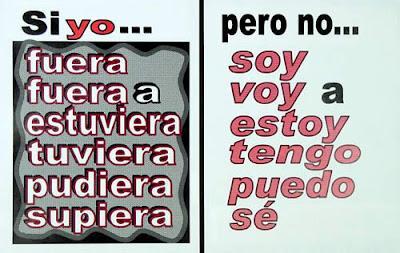
Few things are more tricky than that pesky mode/mood, the subjunctive.
I've always thought it was better to just learn the most common applications
(e.g. "si yo fuera...", "si tuviera que...") rather than master the tense overall.
Found this graphic on this website, which offers some nice practical Spanish lessons....
but fails to mention, "fuese, fuese a, estuviese, tuviese, pudiese, supiese", also all correct.
So why not add Pérez-Reverte to the reading list this summer? Or at least venture away from the conventional Spanish Lit list and try out some of these more contemporary authors? (Enough Quijote!) You'll get to exercise a more contemporary, "fresher" Spanish, and maybe, just maybe, it will give you a more contemporary "fresher" viewpoint of Spaniards than the usual "Hemingway paradigm" fare.
